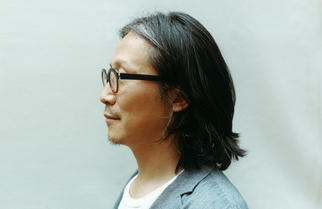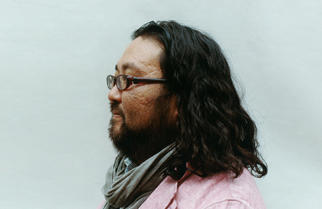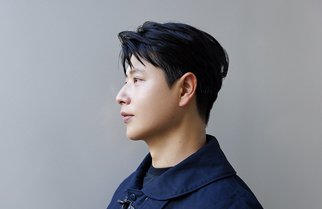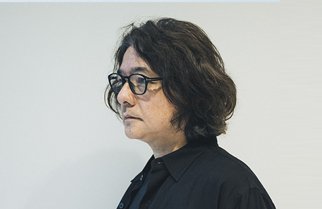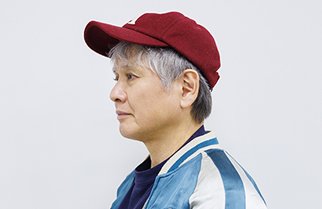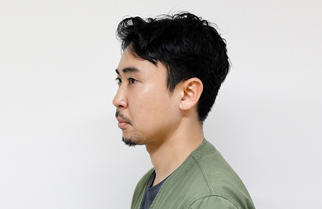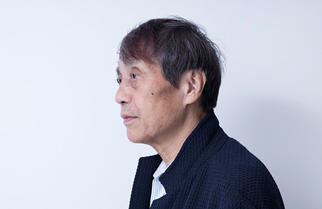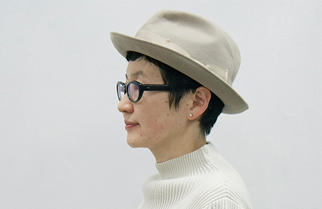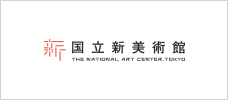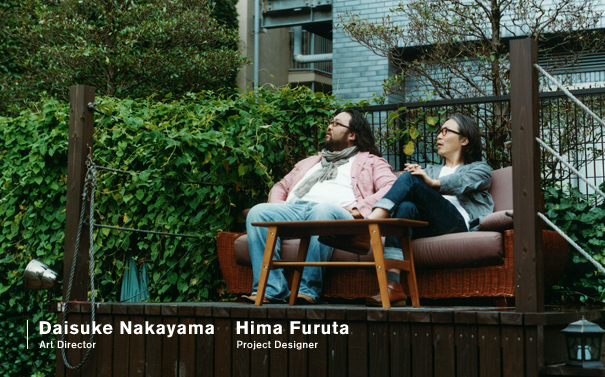
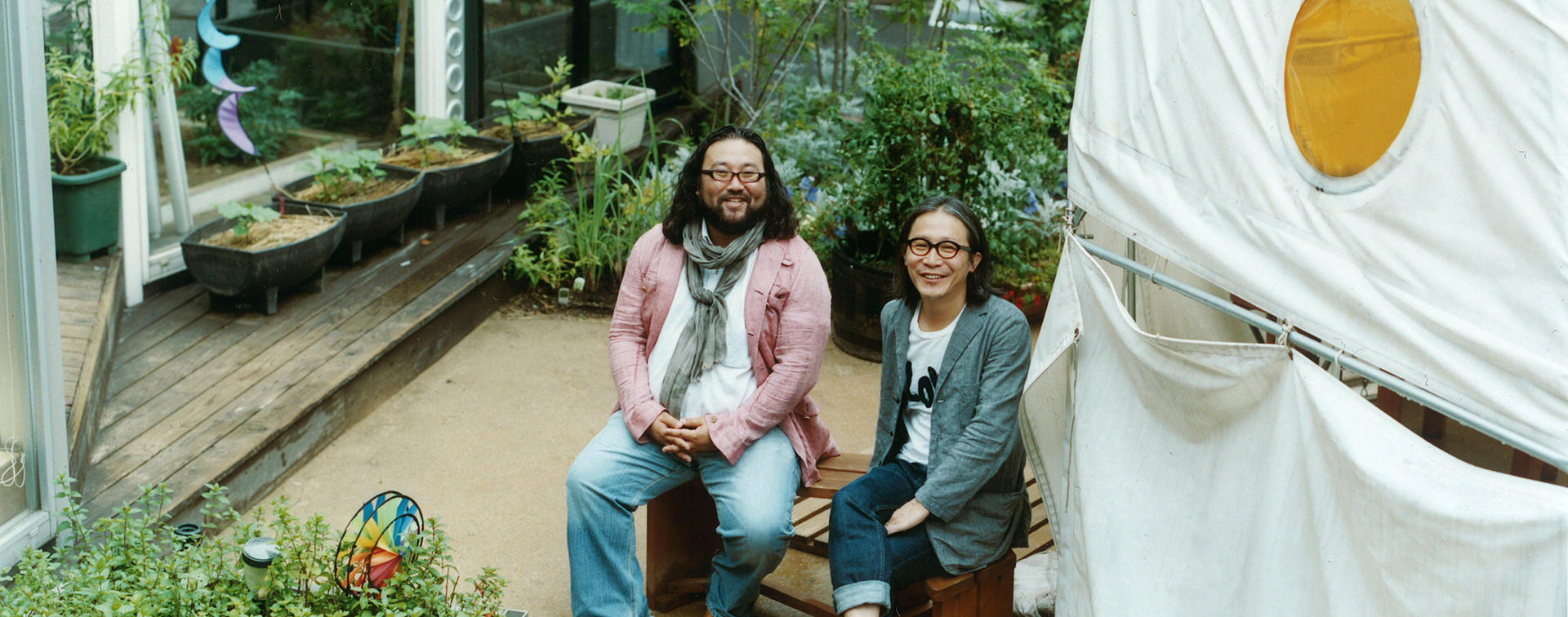
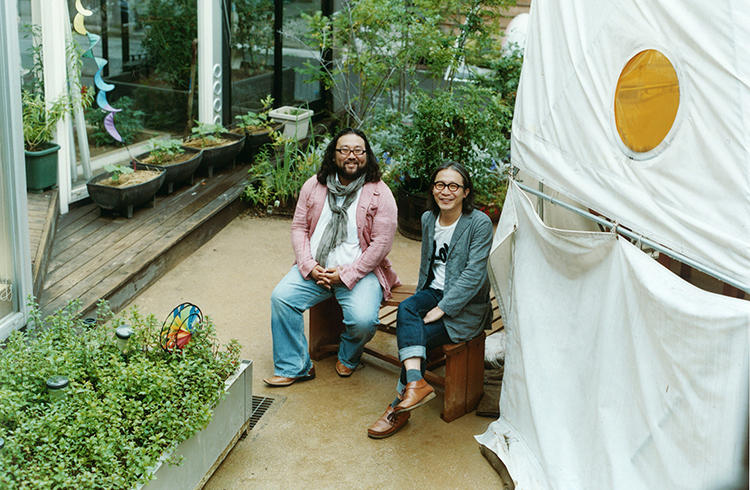
How would you turn Roppongi into an area of Design & Art?
"I would like to make Roppongi a place where more young people can like. - Nakayama I hope Roppongi continues to be an attractive place to meet people. - Furuta"
A contemporary artist who has gained worldwide recognizition, Daisuke Nakayama also works as an art director of spaces such as commercial venues. When asked to think about Roppongi, Nakayama said he would like to hold talks with Hima Furuta. Furuta is a project designer who was born and raised in Roppongi and works here, utilizing his parents' home. Furuta renovated part of the family house to open an agricultural experimental restaurant dubbed "Roppongi Nouen Farm." Furuta is one of the key people who will be responsible for shaping Roppongi in the future. Nakayama says he often goes to Furuta's restaurant, and it was there that the two had their conversation.
Roppongi is a modern version of the dynamic Dejima
FurutaI don't think that a town should assert itself as being a town of design and art. That should be something that people in places outside of the town should be saying. An "ikemen" (a good-looking man) doesn't go about saying, "I'm an 'ikemen'". It's the people around him who say, "He's an 'ikemen'" and that's how he gets his identity. I love design and art, and since I'm a resident of Roppongi, I also hope that this town will become cool, but I don't think it's a good idea to try to impose a certain image of a town in a top-down way.
Making definitions like that is similar to a person going to a local government somewhere and making sudden decisions, saying things like "The chestnuts grown here are famous, so let's make this a chestnut town". For a Roppongi resident, the question that arises is "For whom do we need to make this an area of design and art?" Is it for the people who visit this place, or is it for the people who live here? Or is it for the people who will work here in the future? This is probably a matter that can be discussed from various perspectives.
NakayamaIt seems to me that using art and design to build a town has already become very set - like a schoolbook - and is no longer very original. There's a tendency to believe that you can hold an event and make it more interesting if you use the word "art" to describe something ambiguous, or that you can attract interesting people if you call people who are a bit eccentric "artists."
But I think Roppongi already has this foundation of interesting and different qualities. There are many foreigners, and there are all kinds of "wordly" places in the drinking areas. Everything is all mixed up, and the energy itself could perhaps be called art.
FurutaI agree. Roppongi is a town that has diversity. There's an atmosphere of "anything goes". That's why I think Roppongi is a modern version of Dejima(an island built in the 17th century in Nagasaki where Japan traded with the outside world). During the Edo period when Dejima existed, there must have been a chaotic sort of dynamism in Nagasaki. All kinds of people from foreign countries were there, and it was a place that was stimulating for young Japanese people like Ryoma Sakamoto. Filled with all sorts of things and people, the place must have had a mature sense of humor and playful spirit. In that aspect, Nagasaki was probably an area of design and art of its time.
Nakayama"Dejima" is a clever way to describe Roppongi. I think that since Roppongi is an international place, we might make it even more international. Foreign tourists who are interested in the nightlife come here, but it might be a good idea to make it a place where foreign students and people working at foreign corporations can lead ordinary lives.
Energy that is ignited by the residents
NakayamaI think Roppongi already has all the elements necessary for it to be an area of design and art. Long ago, AXIS was built, and there used to be WAVE. Then Roppongi Hills was built, and then we got Tokyo Midtown. We also now have the Mori Art Museum, the 21_21 DESIGN SIGHT, the Suntory Museum of Art and the National Art Center, Tokyo. Speaking in terms of size, Roppongi is probably among the top places in Japan with the largest amount of area devoted to art facilities; I think people outside of Roppongi have longed looked at it as an area of design and art.
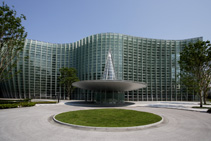
The National Art Center, Tokyo
Established in 2007 on the architectural concept of "a museum in the woods", the National Art Center, Tokyo is Japan's largest museum. The building was designed by Kisho Kurokawa, and the logo by Kashiwa Sato. The facility houses a museum shop called "Souvenir from Tokyo", three cafés and a restaurant.
7-22-2 Roppongi, Minato-ku, Tokyo
But nearly all the people who come to Roppongi are non-residents. I don't think the people of Roppongi should focus too much on welcoming visitors from outside because then the reason for being in Roppongi would be to do business with them. What is really interesting is the energy that is ignited in a place by the residents. It would be great if the lawns in Tokyo Midtown becomes the nearby park that Roppongi residents often go to, or if The National Art Center, Tokyo becomes the place that residents usually visit to look at paintings.
FurutaYes, it would be nice if Roppongi could become more of an ordinary place.
If people view Roppongi as a whole as being unordinary - as being one big art museum - then they will come to appreciate art and learn about designs, and then they will just go home. These days, there is more value in making one's ordinary life more interesting than in pursuing gorgeous, out-of-the-ordinary things. People use the word "Riaju" (a coined word meaning enriching one's real life), and ever since the earthquake in March last year, that is what people seem to be genuinely seeking.
When my work takes me to the countryside, there are times when I look at the fishermen and think they look more cool. I don't think this feeling is due to a sense of nostalgia or a longing for the countryside; I think they look cool because designs are properly incorproated into their everyday lives. In Roppongi there are plenty of buildings, but in terms of a proper environment necessary for the everyday lives of people, there is still a lot that needs to be done.

The resilience of being unaffected by new buildings
NakayamaThis "Roppongi Nouen Farm" is fun because it's run by people who actually live here. This place was born because you, Furuta-kun, had the personal wish to appreciate greenery and eat good, proper food. That kind of thing has become special now, especially from the perspective of people outside Roppongi. So to make Roppongi a more interesting place, maybe what is needed is not a project to promote the area, but efforts to pursue personal dreams.
FurutaThe population in Roppongi is currently shrinking. The buildings have increased in number and statistics show the population is growing, but in the shopping districts, there is hardly anyone who has been living here a long time. When they are young, people make money here and pay taxes, but when they grow old, they leave. Minato-ku is one of the places where the least amount of taxes is spent on welfare. We need an environment where people are more connected with people. We need more longtime residents of Roppongi who will collaborate in doing interesting things.
NakayamaI lived in New York for six years and it's one of my favorite cities. I particularly like places there that have an "outsider" atmosphere - like Chinatown and Tribeca. In Japan, that same kind of atmosphere can be found in Tokyo's Azabu Juban. I love that downtown feeling where it seems as nothing will affect the place, no matter what kind of new buildings are constructed. Azabu Juban festival is still going strong after all these years. Perhaps Roppongi needs the kind of resilience that Azabu Juban has. Maybe what Roppongi lacks is those kind of perky downtown shop owners who are proud of their long tradition.
FurutaIt's an attractive town because you can see the faces of the people. Azabu Juban is where we always go shopping.
NakayamaSo in your eyes, Azabu Juban is a part of Roppongi.
FurutaOh yes, it's Roppongi to me. Azabu Juban is the shopping area for us locals. When I was a kid, I used to go to the "Shimizuya" store to buy toys. And at the sports event at elementary school, the class that won would always be treated to the taiyaki (fish-shaped cakes) from Naniwaya Sohonten. The man who owns the "tsuribori" (fishing pool) that I used to go to all the time is currently head of the "jichikai" (community assocation) at Roppongi Hills.
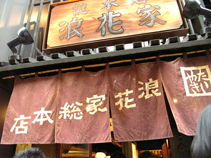
Naniwaya Sohonten
A long-established taiyaki shop. Its very popular taiyaki have thin, crusty surfaces burnt a golden brown, and azuki bean fillings that are not too sweet. Inside the shop there is space for people to eat and drink. There is no air-conditioner, but the "kakigori" (shaved ice dessert) and ice with "ramune" (a soda drink) served here on hot summer days are delicious.
1-8-14 Azabujuban, Minato-ku, Tokyo
Streets that have city lifestyle features
NakayamaRoppongi seems to be saturated with urban qualities, so I think the people who have been living in this small area for a long time should get together and come up with ideas of their own, and do things like start a festival or a bazaar. Such efforts to add color to city life would mean that people are designing their lifestyle in their neighborhood, and if we could see more of that, I think Roppongi would really become an area of design.
While we were talking about Dejima a few minutes ago, I remembered this wish I have: I wish that gates could be set up in Roppongi. When I'm walking in the streets thinking that I'm in Roppongi, I sometimes find that I've actually come to Aoyama. I hate that. So my request is, please build gates like in a Chinatown.
FurutaSo you want Roppongi to have a West Gate and an East Gate?
NakayamaThat's right. I think it might be a good idea to define the borders of the small area and to set rules inside it. That way, steps could be taken to make the area inside the gates look different from the town outside. So people going up Imo-araizaka slope would think, "Oh, I'm entering Roppongi now." It would be such fun if there was a Roppongi entrance gate on the Imo-araizaka slope; I would love getting that exciting feeling. Many buildings have been constructed that soar up into the sky, but people don't look upward all the time, and I think it's important to change the appearance of the streets from the ground as well.
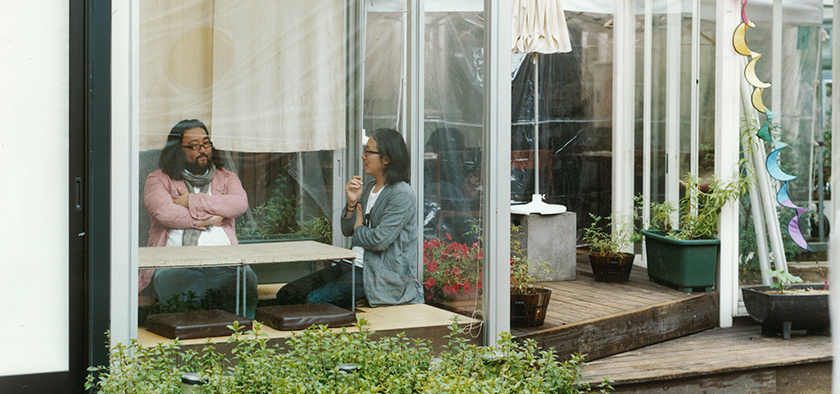
Roppongi is a nice place to live. It is important to connect with people.
FurutaSpeaking as a resident, I think Roppongi is a very nice place to live. There are many parks, lots of great food, and it's so convenient for going out to any place. If you want to go somewhere quiet, you can go on a trip. In terms of turning on and off the switch, Roppongi is an excellent place to be when you are "on".
So I wish that it will become a place where more young people can live. Daisuke-san, you lived in New York, didn't you? I used to live there too. In New York there are places where the property is expensive and there are lots of rich people, but at the same time there are places where young people can afford to live, and the co-existence is what makes it interesting.
NakayamaThat's so true. Perhaps when they develop buildings here,they should be required to always build the same quantity of apartments for students. How about that? These days, there are new modes of living such sharehouses, and students would surely benefit from living in the middle of the city. Nowadays, young people in the countryside tend to stay where they are and don't try to explore the outside world.
FurutaThat's because people in the countryside are well off. Almost all the necessary infrastructure is in place, and you can buy everything online. There's no point now in the cities trying to become more attractive in a materialistic way. There's more value in the coincidences that occur such as meeting people you didn't expect to meet.
It boils down to people, ultimately. The connection and relationships between people. Without that, nothing can take place. So before thinking about having artists create works and making this a cool area through design, the most important thing is to think about how Roppongi can become a place for people to make encounters.
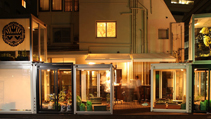
Roppongi Nouen Farm
"Roppongi Nouen Farm" is an "agricultural experimental" restuaurant. It serves meals made from fresh produce that are delivered each day directly from the farms. It is a unique place that allows peole to appreciate the wonderfulness of farming.
6-6-15 Roppongi, Minato-ku, Tokyo
Let's be more specific. Let's divide things and deliver results.
NakayamaGoing back to the theme of making this an area where young people can live, I think that to the question "What would you do in Roppongi?" my reply would be, "Build apartments for students." That would be ultimately what I would like to do. It would be nice if students could live here and commute to the universities in the countryside. For example, commuting from Roppongi to an art college in Hachioji and coming back each day.
FurutaI used to commute like that. I used to play soccer at high school, and I went each day from Roppongi to Hiratsuka - the grounds of Shonan Bellmare. Then I would get on the last train and return to Roppongi.
NakayamaAah, soccer... How about making a team for the J. League? You know, a team in Roppongi. It might be interesting to have a soccer team in the middle of Tokyo which everyone can root for. We already have F. C. Tokyo though.
It's annoying how they put "Tokyo" in names like that when Tokyo is actually such a large place. In baseball too, they say "Tokyo (Yomiuri) Giants" but it seems too general to me. They should be more specific and say, "Bunkyo-ward Giants" instead. (laughs)
FurutaThat's true. We should certainly be more specific. This is something that's often on my mind, but I think from now on, we are going to see the advance of two trends - one for integration and one for segmentalization. A lot of things that have so far been scattered are going to become integrated, and what used to be regarded as one thing is going to become divided up into smaller pieces.
For example, at school there are different classes for math and Japanese, but perhaps in the future they might be blended and taught as one subject. Or perhaps names like Tohoku will no longer be used to refer to a certain area because we will become more aware of the identities of all the different regions within that area.
NakayamaYes, I frequently get that feeling myself. When we hold meetings now, I often propose that we do the thinking after dividing things up. There are many projects that are being undertaken from viewpoints that are too encompasing. I feel it's important to be more thoroughly specific and deliver proper results.
FurutaUp till now, priority has been placed on efficiency, and people thought that getting everything in one bulk was a good thing. But now, instead of going to the supermarket, they prefer to buy fish from the fishmonger and meat from the butchers in order to get better food. Better efficiency does not mean that people's motivation will become higher. As things get more and more convenient, we are seeing more contradictions. Take farming for example. In the past, there were plenty of fields even in Tokyo, but then they constructed buildings all over the place and now, establishments like "Roppongi Nouen Farm" have become special.
We need balance. As a person who lives here, I wondered what was lacking in Roppongi, and I realized that we need gardens, greenery, farming. I'm just trying to be balanced, that's all. We're in the city but that doesn't mean that everything should be functional; it is not okay to have nothing ripening on plants.
Editor's thoughts
The interview with Nakayama-san and Furuta-san was held in the morning. They had both been watching the UEFA Euro 2012 Final overnight and I could not help noticing their sleepy eyes as they told us their proposals to change Roppongi. All the staff members were taken by surprise by Furuta-san's unexpected remark that the population of Roppongi is shrinking. (edit_rhino)




